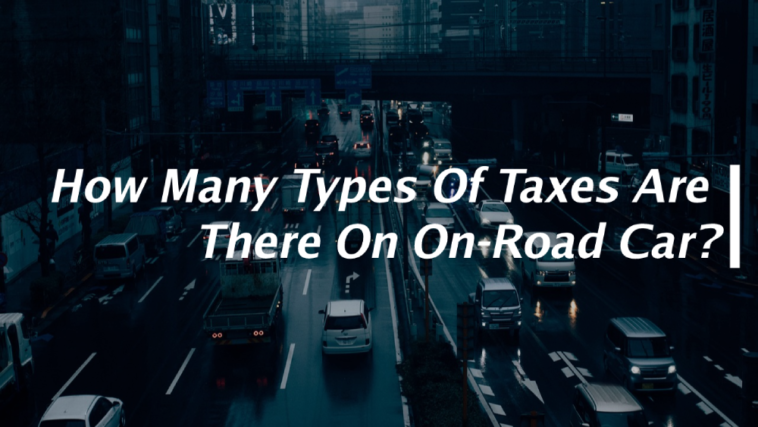How Many Types Of Taxes Are There On On-Road Car? Hey, readers! Once in your life, you must have thought that why a car is priced differently in the showroom and why the price suddenly changes at the moment when you take the car out of the showroom for your home. However, we all know that on a car usually there are multiple kinds of taxes applicable, and by the time you take it out you have to pay all the taxes. Although, most people only know about some basic things such as road taxes, insurance, and so on. But do you know that there are several other taxes as well that change the price of a car? So, stay here till the end to read the complete information on, how many types of taxes are there on a car, and why leads to car price changes.
India is a vast country with diverse geographical, economic, and infrastructural differences between its cities. One of the noticeable aspects of car purchases in India is the varying prices of vehicles across different cities. Additionally, the price of a car often increases after it leaves the showroom. These variations can be attributed to several factors, including taxes, transportation costs, and local market dynamics. As we told about that we are going to talk about the reasons behind different car prices in different cities in India and explore the various types of taxes imposed on car purchases, so scroll on.
Why Car Is Differently Priced In Different Cities?
Well, when it comes to talking about a car’s price, then you must have seen people searching for different cities no matter if they live in the same from where they are looking to buy or not. But behind this there is a reason which is, a car can be priced differently in another city. However, there would be many reasons behind this such as road tax, logistics tax, and others, so here are the major points that perhaps work for you.
- Transportation & Logistics Costs: The cost of transporting vehicles from manufacturing plants to different cities can vary based on the distance and infrastructure. Cities closer to manufacturing plants or ports generally have lower transportation costs, which can reflect lower car prices.
- Local Market Demand & Competition: Cities with higher demand and intense competition among car dealerships may witness lower prices due to the availability of discounts, promotional offers, and attractive financing options.
- Local Taxes & Levies: Municipal taxes, octroi (entry tax), and other local levies imposed by the city or state authorities can differ across regions, contributing to the variations in car prices.
Why Price Increases After Leaving The Showroom?
As you all know that till a car is parked in a showroom it is not your headache to take care of the vehicle, but the moment it comes out on your name, then it comes with several things such as insurance, RTO tax, registration charges, and many more things. Below are the major points for the same reason that may help you in understanding the term.
- Insurance premiums: Cars need to be insured before they can be driven legally on Indian roads. Insurance premiums, which depend on factors such as car model, age, and location, can increase the overall cost of the vehicle.
- Registration charges: Once a car is purchased, it needs to be registered with the Regional Transport Office (RTO). Registration charges, which include road tax, number plate fees, and other administrative expenses, vary across states and can significantly impact the final price.
- Value-added features and accessories: Showrooms often offer additional features and accessories such as alloy wheels, touchscreen infotainment systems, and premium upholstery. These upgrades can increase the cost of the car beyond its base price.
- Dealer handling charges: Dealerships may charge handling or delivery fees to cover administrative costs associated with preparing the vehicle for delivery and completing paperwork.
Types Of Taxes On Car Purchases
Although, above you read about how the price change after taking a car out of the showroom and also why different regions have different prices. Well, here finally we are talking about different types of taxes on a car purchase.
- Excise duty: The central government levies excise duty on the manufacturing of cars. It is a part of the vehicle’s base price and is included in the showroom price.
- Goods and Services Tax (GST): GST replaced multiple indirect taxes and is levied on the ex-showroom price of the car. It consists of a central GST (CGST) and a state GST (SGST), with the rates varying based on the type and size of the car.
- Road tax: Road tax is imposed by state governments and varies across states. It is a one-time tax paid at the time of registration and is based on factors like engine capacity, vehicle type, and price.
- Additional cess and surcharges: To fund specific initiatives or cover environmental costs, governments may impose additional cess or surcharges on car purchases. These can include infrastructure cess, green tax, or pollution control cess.
Finally, saying this would not be bad that the varying prices of cars in different cities in India can be attributed to a combination of factors, including transportation costs, local market dynamics, and regional taxes. Additionally, the price of a car often increases after it leaves the showroom due to insurance premiums, registration charges, and other add-on features. Understanding these factors and the types of taxes imposed on car purchases can help buyers make informed decisions and budget accordingly when considering a vehicle purchase in different cities across India. Stay in the loop to read more articles on such topics.






GIPHY App Key not set. Please check settings